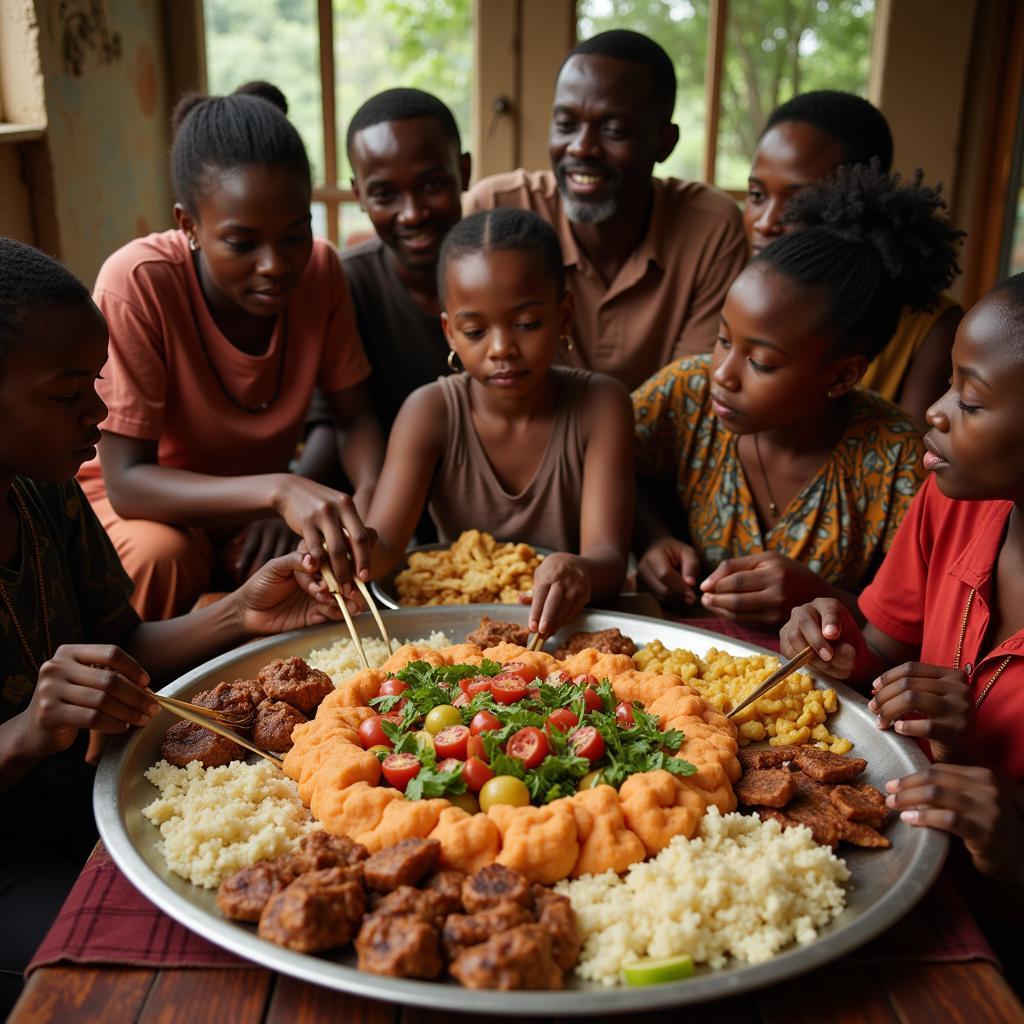Exploring African Food and Drink: A Culinary Journey
African Food And Drink offer a vibrant tapestry of flavors, ingredients, and traditions, reflecting the continent’s diverse cultures and rich history. From the spicy stews of West Africa to the fragrant tagines of North Africa, every region boasts unique culinary treasures waiting to be discovered. Let’s embark on a flavorful journey and explore the diverse world of African cuisine.
A Continent of Flavors: Regional Specialties in African Food and Drink
African food and drink varies significantly across its vast expanse. North African cuisine, for example, is heavily influenced by Mediterranean and Arabic flavors, showcasing dishes like couscous, tagines, and a variety of flavorful spices. West African food often features hearty stews, such as peanut soup and jollof rice, rich in spices and often served with fufu or other starchy accompaniments. East African cuisine incorporates influences from the Middle East and India, with dishes like injera (a spongy flatbread) and flavorful curries. Southern Africa is known for its braais (barbecues), biltong (dried, cured meat), and potjiekos (stews cooked in a cast-iron pot). african hibiscus drink is a popular refreshment in many parts of the continent.
West African Delights: From Peanut Soup to Jollof Rice
West African cuisine is renowned for its bold flavors and the artful use of spices. Peanut soup, a creamy and satisfying dish, is a staple in many West African countries. Jollof rice, a vibrant and flavorful rice dish cooked with tomatoes, onions, and peppers, is another popular choice, often enjoyed at celebrations and gatherings. The use of local ingredients, such as okra, cassava, and plantains, adds a unique dimension to West African cooking.
The Importance of Staple Foods: Grains, Tubers, and Legumes
Across the continent, staple foods form the foundation of many meals. Grains like millet, sorghum, and maize are widely consumed, often ground into flour and used to make porridges, breads, and other dishes. Tubers such as yams, cassava, and sweet potatoes provide essential carbohydrates and nutrients. Legumes, including beans, peas, and lentils, are important sources of protein. These staple foods are not only nutritious but also culturally significant, playing a vital role in traditional ceremonies and customs.
Exploring East African Flavors: Injera and Beyond
East African cuisine offers a unique blend of flavors and culinary traditions. Injera, a spongy, slightly sour flatbread made from teff flour, is a staple in many East African countries. It is often used to scoop up flavorful stews and curries, creating a delightful culinary experience. Coffee, another important part of East African culture, is known for its rich aroma and bold flavor. 10 facts about african elephants can provide some interesting insights into the region’s wildlife.
Beyond the Plate: The Cultural Significance of African Food and Drink
Food and drink in Africa are more than just sustenance; they are deeply intertwined with social customs, traditions, and celebrations. Meals are often communal affairs, bringing families and communities together. Sharing food is a sign of hospitality and respect. Certain dishes are prepared for specific occasions, such as weddings, funerals, and religious festivals, adding a deeper layer of meaning to the culinary experience. For example, in some cultures, offering african elephant eating habits can be a sign of respect.
 African Communal Meal
African Communal Meal
A Culinary Adventure Awaits: Discovering African Food and Drink
From the bustling markets to the family kitchens, African food and drink offer a rich and rewarding experience for anyone seeking culinary adventure. Embark on a journey of discovery and savor the vibrant flavors of this diverse continent. You might even discover african clubs in cairo offer a unique blend of African and Egyptian cuisine.
In conclusion, African food and drink provide a unique and diverse culinary experience, reflecting the continent’s rich cultural heritage. From traditional stews to exotic fruits, there’s something for everyone to savor. So, why not embark on a culinary adventure and discover the vibrant flavors of Africa? Don’t forget about unique gifts like the african buffalo calf schleich.
FAQ:
- What are some popular African dishes?
- What are the main ingredients used in African cooking?
- What is the cultural significance of food in Africa?
- Where can I find authentic African restaurants?
- What are some traditional African drinks?
- How does African food vary across different regions?
- Are there any vegetarian or vegan options in African cuisine?
Need help planning your African culinary adventure? Contact us at +255768904061, kaka.mag@gmail.com, or visit us in Mbarali DC Mawindi, Kangaga, Tanzania. Our 24/7 customer service team is here to assist you.
